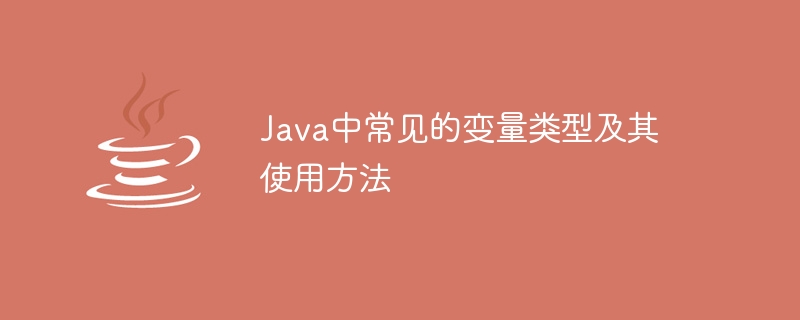

Common variable types in Java and how to use them
In Java programming, a variable is an element used to store data. There are different types of variables in Java depending on the data type. Understanding and correctly using these variable types is important for writing efficient, readable code. This article will introduce common variable types in Java, including integer types, floating point types, character types, Boolean types, and string types, and provide corresponding code examples.
1. Integer type
The integer type is a variable type used to store integer values. Java provides four integer types: byte, short, int and long. These types vary in scope and space. Choosing the appropriate type can improve the efficiency of your code.
Sample code:
byte num1 = 10; byte num2 = -5;
Sample code:
short num1 = 100; short num2 = -200;
Sample code:
int num1 = 1000; int num2 = -2000;
Sample code:
long num1 = 1000000000000L; long num2 = -2000000000000L;
2. Floating point type
The floating point type is used to store values with decimal points. There are two floating point number types provided in Java: float and double. The precision of the double type is higher than that of the float type, so it is recommended to use the double type.
Sample code:
float num1 = 3.14F; float num2 = -2.5F;
Sample code:
double num1 = 3.14159; double num2 = -2.71828;
3. Character type
The character type is used to store a single character, which is represented by single quotes ' '.
Sample code:
char ch1 = 'A'; char ch2 = '中';
4. Boolean type
The Boolean type is used to store logical values and has only two values: true and false. The Boolean type is suitable for judging conditions and control processes.
Sample code:
boolean flag1 = true; boolean flag2 = false;
5. String type
The string type is the variable type used to store strings. In Java, a string is a class, and you can use quotes " " or double quotes " " to represent a string.
Sample code:
String str1 = "Hello"; String str2 = "World";
In summary, this article introduces the use of common variable types in Java and provides corresponding code examples. Understanding and using these variable types correctly will help you write efficient and readable Java code.
The above is the detailed content of Different types of Java variables and their usage. For more information, please follow other related articles on the PHP Chinese website!




